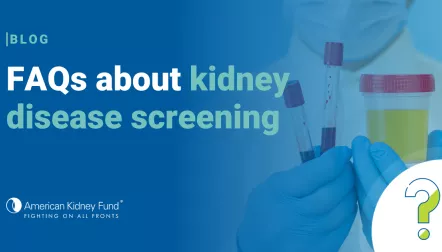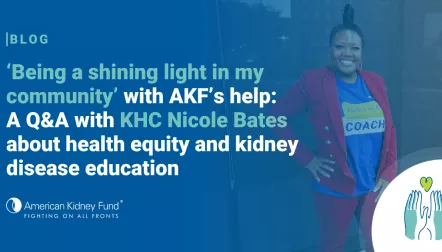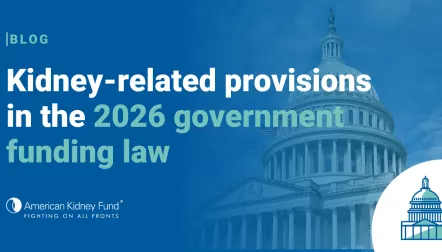
Blog post
AKF Ambassador Spotlight: Christopher Knippers

What made you want to become an AKF Ambassador?
I wanted to become an Ambassador for AKF because of the advocacy that AKF is doing for patients who have a largely ignored disease. I want to help in this effort to help fellow patients, and to raise educated knowledge of this disease.
How has being an Ambassador helped you?
I have been personally helped by being an Ambassador in that I now am doing something about a cause that I believe in and have been complaining about while not doing anything to actually help in the way I am now. I have a greater sense of purpose and a sense of some control of my destiny with kidney disease.
What have you learned from being an Ambassador?
Since becoming an Ambassador, I have learned that there really is a more urgent need to advocate for kidney patients than I once believed. There are organizations literally trying to work against our interests and care. We need to stand up and be heard, rather than standing on the sidelines being passive. AKF is the only organization of which I am aware who is doing this vital work.
Why should others become Ambassadors?
Others need to help us in this fight for our own interests and health care; and to show the world that we are not just sickly dying people, but people with lives and loves and a great deal of talent to offer the world.
What is something you've learned about kidney disease and dialysis that you wish you'd known a lot sooner?
I wish I had known from the beginning how many people are still out there living relatively full lives while on dialysis. I would not have felt so alone in that regard.
How would you like to stay connected to other AKF Ambassadors?
I would like to stay in touch with other Ambassadors through at least annual meetings and through social media or email to share how we are managing our lives while on dialysis.
What are your best tips to get through the dialysis treatments?
Getting through treatment requires mental gymnastics, in addition to taking the best care of your health possible. Keep your thoughts about yourself and your situation as positive as possible. Avoid ever thinking of yourself as "A Kidney Disease (or, Dialysis) Patient." You are a human being with life, love and purpose. Thinking in a "victim" mentality is destructive and untrue. Stay as engaged in life and your passions as possible. (My passions happen to be writing, and volunteer work for my church.) Focus on every positive thing you can think of, at all times. You don't have the luxury of a negative thought. Your job now is to be an example of overcoming adversity with courage and conviction in order to give others hope and inspiration.
While in the actual dialysis session, practice relaxation and meditation techniques. Take a workshop or get coaching in this if you must.
What do you wish elected officials knew about dialysis patients?
I wish elected officials knew how much dialysis patients have to offer, and how valuable our lives are.
Do you have any advice for newly diagnosed kidney patients?
Newly diagnosed patients need to learn that dialysis is effective and is not a death sentence. It becomes a routine (though relatively small) part of your health care regimen and life that will keep you on track. Don't let dialysis become the focus of your life. Even the eating plan is not as bad as you might think. You can adjust to all this effectively and finding meaning and purpose in your life.
How does it help having a family member be part of the process?
It is vital to have support from a friend or family member in your life whether a dialysis patient or not; but now you really need a special kind of nonjudgmental empathic support from someone who cares enough to be educated about the needs of a dialysis patient, and will be a positive influence in your life, encouraging you.
What do you wish other family members knew about kidney disease or knew about helping others?
Family members need to remain positive and encouraging to the kidney patient. Offer tangible as well as emotional support (be careful not to be patronizing or pitying). Patients sometimes feel a bit physically and/or cognitively weak immediately following treatment and might need a ride home or help with preparing a meal. Most patients bounce back by the following day.
What are some interesting facts about yourself that you'd like to share?
I have overcome numerous life-threatening conditions in my life and have been pronounced dead at a very early age. I have overcome being brain-dead from a landslide, then unplugged from life support so I could die. I went on to earn a Ph.D. in clinical psychology, just for spite. I have had a remarkable career in psychology and have worked with many people you see on television and in movies and in politics. I still counsel a few of them on a complimentary basis. Since receiving the diagnosis of kidney disease 5 years ago, which I initially was sure was a death sentence, I have become happier than I have ever been in my entire 66 years, despite now having a significantly reduced income from my days as a busy psychologist. My strength comes from the beautiful love and support of my friends, and family, as well as from a very deep faith in God (for very good reason). There have been many amazing miracles in my life, and there are more to come.





